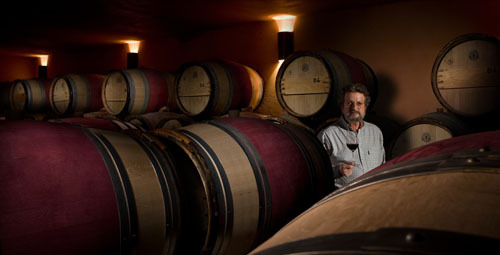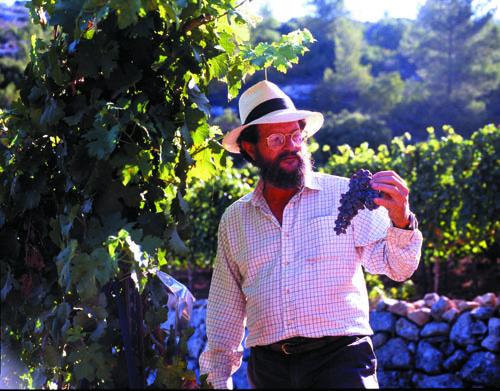An inside look at Domaine du Castel
Is the wine worth the money?
by Adam Neustadter
Issue of March 19, 2010/ 4 Nissan 5770Eli Ben Zaken, owner of Domaine du Castel winery, inspects grapes in the vineyard. Zaken, is self-taught since founding Castel in 1995.
The first thing I learned during my visit to the Castel Winery is that it is no small operation.
Domaine du Castel, in Harei Yehuda, the Judean Hills, now produces over 100,000 bottles a year, divided over just three types of wine. Grand Vin, the flagship bottle, is aged for 22-24 months in new French oak barrels. It is a Bordeaux style blend containing 70 percent Cabernet, 20 percent Merlot, with the remaining 10 percent coming from Cabernet Franc, Petite Verdot and Malbec.
Petite Castel, a less expensive dry red from 2008, contains the same grapes but in different percentages. It is aged for 16 months in both new and used French oak barrels.
The third bottle, the “C” Blanc, is a dry white wine, benefitting from a mostly all oak fermentation. A third of the wine is aged in new French oak barrels, another third in one-year-old French oak barrels, and the last third in barrels that are two-years-old.
All three Castel wines sell out yearly; about half is sold abroad. The owner and wine maker, Eli Ben Zaken, is self taught and has made the winery the example and envy of every entrepreneur wine maker in the country.
When I asked Ben Zaken what made him successful, he said that it’s all about putting “effort in all the right places.” He does not rely on anyone else to do his work for him. The vineyards he uses are grown his way and he sees to them personally. He grows his grapes densely, allowing better fruit to emerge from each vine.
Castel is one of the few wineries of its size that does everything in-house, including testing, labeling, bottling, storage and selling.
I should also point out that Ben Zaken has never considered Castel a boutique winery. As a matter of fact, he hates to be thought of as such. He simply prefers to be called a family business. This also allows him the luxury of not having to chase the next fad and simply make the best wine he can. When I asked why he doesn’t make other varieties, he told me that, “You need to do what you can do.” He also pointed out that when marketing the wine it is important to know your wine’s place.
One of his more clever observations was in response to a question I asked about how the winery could improve. No two vintages are identical, Ben Zaken explained, and when you apply what you learned from the vintage before, you are, in fact “always preparing for last year’s vintage.”
A question I often ask is “What grape do you think Israel will be best known for?” Ben Zaken gave an answer that could only come with the benefit of years of experience. He thought for a moment, then said he didn’t know. He explained that the current Israeli wine industry is only now starting to come into its own. There needs to be more experimentation with more types of grapes in different parts of Israel with different growing capabilities.
In a nutshell, the time I spent with Ben Zaken was great, matched only by the wines he makes.
Adam Neustadter is a partner in decantingisrael.com, has taught
about wine and was a sales executive for Royal Wine Corporation for 15 years
until his aliyah in 2006. He and his family live in Chashmonaim.

 80.0°,
Partly Cloudy
80.0°,
Partly Cloudy 







